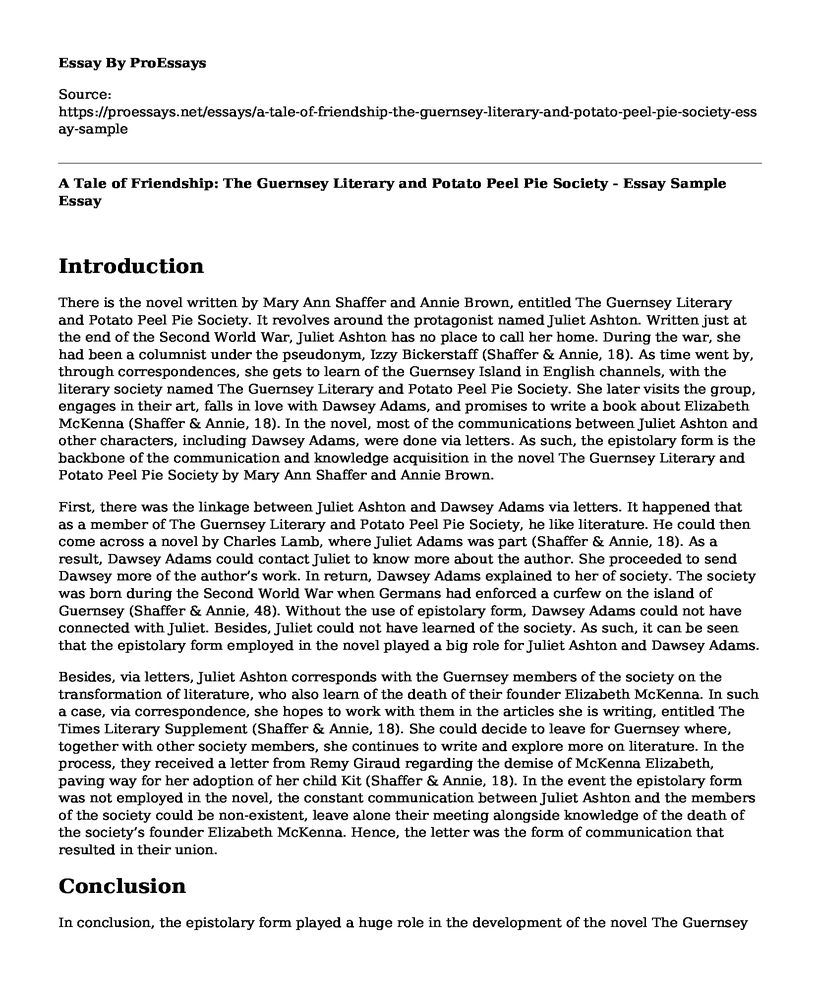Introduction
There is the novel written by Mary Ann Shaffer and Annie Brown, entitled The Guernsey Literary and Potato Peel Pie Society. It revolves around the protagonist named Juliet Ashton. Written just at the end of the Second World War, Juliet Ashton has no place to call her home. During the war, she had been a columnist under the pseudonym, Izzy Bickerstaff (Shaffer & Annie, 18). As time went by, through correspondences, she gets to learn of the Guernsey Island in English channels, with the literary society named The Guernsey Literary and Potato Peel Pie Society. She later visits the group, engages in their art, falls in love with Dawsey Adams, and promises to write a book about Elizabeth McKenna (Shaffer & Annie, 18). In the novel, most of the communications between Juliet Ashton and other characters, including Dawsey Adams, were done via letters. As such, the epistolary form is the backbone of the communication and knowledge acquisition in the novel The Guernsey Literary and Potato Peel Pie Society by Mary Ann Shaffer and Annie Brown.
First, there was the linkage between Juliet Ashton and Dawsey Adams via letters. It happened that as a member of The Guernsey Literary and Potato Peel Pie Society, he like literature. He could then come across a novel by Charles Lamb, where Juliet Adams was part (Shaffer & Annie, 18). As a result, Dawsey Adams could contact Juliet to know more about the author. She proceeded to send Dawsey more of the author’s work. In return, Dawsey Adams explained to her of society. The society was born during the Second World War when Germans had enforced a curfew on the island of Guernsey (Shaffer & Annie, 48). Without the use of epistolary form, Dawsey Adams could not have connected with Juliet. Besides, Juliet could not have learned of the society. As such, it can be seen that the epistolary form employed in the novel played a big role for Juliet Ashton and Dawsey Adams.
Besides, via letters, Juliet Ashton corresponds with the Guernsey members of the society on the transformation of literature, who also learn of the death of their founder Elizabeth McKenna. In such a case, via correspondence, she hopes to work with them in the articles she is writing, entitled The Times Literary Supplement (Shaffer & Annie, 18). She could decide to leave for Guernsey where, together with other society members, she continues to write and explore more on literature. In the process, they received a letter from Remy Giraud regarding the demise of McKenna Elizabeth, paving way for her adoption of her child Kit (Shaffer & Annie, 18). In the event the epistolary form was not employed in the novel, the constant communication between Juliet Ashton and the members of the society could be non-existent, leave alone their meeting alongside knowledge of the death of the society’s founder Elizabeth McKenna. Hence, the letter was the form of communication that resulted in their union.
Conclusion
In conclusion, the epistolary form played a huge role in the development of the novel The Guernsey Literary and Potato Peel Pie Society. Through it, the Dawsey Adams, society members, and Juliet Aston contacted and knew each other. It led to their union, alongside the knowledge of Elizabeth McKenna’s death. Without the use of letters, none of the above could have occurred.
References
Shaffer, Mary Ann, and Annie Barrows. The Guernsey literary and potato peel pie society. Dial Press, 2009.
Cite this page
A Tale of Friendship: The Guernsey Literary and Potato Peel Pie Society - Essay Sample. (2023, Aug 21). Retrieved from https://proessays.net/essays/a-tale-of-friendship-the-guernsey-literary-and-potato-peel-pie-society-essay-sample
If you are the original author of this essay and no longer wish to have it published on the ProEssays website, please click below to request its removal:
- Analysis of Alexander Pope's "An Essay on Man"
- Essay Sample on Greek Characterization
- Essay Sample on Adaptations of Shakespeare's Work
- Defending Macbeth on the Death of Duncan Essay
- Kollontai's 'Sisters' - Literature Analysis Essay
- Essay Example on Themes in Literary Works: Major vs. Minor
- Essay Sample on Chun-Hyang: Kisaengs of Goryeo - A Tale of a Female Character







